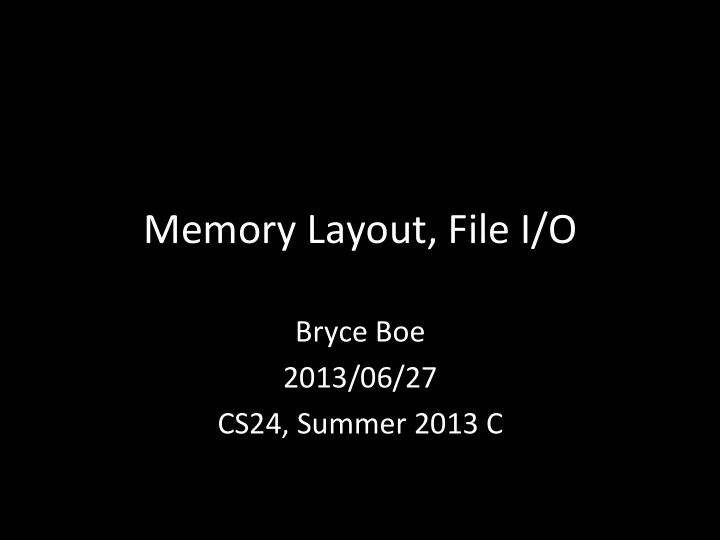

Memory ¡Layout, ¡File ¡I/O ¡ Bryce ¡Boe ¡ 2013/06/27 ¡ CS24, ¡Summer ¡2013 ¡C ¡
Outline ¡ • Review ¡HW1 ¡(+command ¡line ¡arguments) ¡ • Memory ¡Layout ¡ • File ¡I/O ¡
HW1 ¡REVIEW ¡
HW1 ¡Common ¡Problems ¡ • Taking ¡input ¡from ¡stdin ¡(via ¡scanf) ¡ • Performing ¡ failure ¡tesPng ¡too ¡late ¡ • Not ¡handling ¡the ¡0 ¡case ¡ • Whitespace ¡issues ¡ • Others? ¡
HW1 ¡SoluPon ¡ • <In-‑class ¡review ¡of ¡hw1 ¡soluPon ¡source ¡code> ¡
MEMORY ¡LAYOUT ¡
View ¡from ¡three ¡Levels ¡ • The ¡address ¡space ¡of ¡a ¡process ¡ • FuncPon ¡acPvaPon ¡records ¡on ¡the ¡stack ¡ • Data ¡within ¡an ¡acPvaPon ¡record ¡
Simplified ¡process’s ¡address ¡space ¡ 0xFFFFFFFF ¡ STACK ¡ HEAP ¡ CODE+ ¡ 0x00000000 ¡
Data ¡Segments ¡ • Code(+) ¡ – Program ¡code ¡ – IniPalizaPon ¡data, ¡global ¡and ¡staPc ¡variables ¡ • Heap ¡ – Memory ¡chunks ¡allocated ¡via ¡malloc ¡ • Stack ¡ – FuncPon ¡acPvaPon ¡records ¡
CreaPng ¡and ¡destroying ¡acPvaPon ¡ records ¡ High ¡Memory ¡ • Program ¡starts ¡with ¡main ¡ top ¡of ¡stack ¡ • main ¡calls ¡strsafeconcat ¡ main ¡ • strsafeconcat ¡calls ¡strlength ¡ • strlength ¡returns ¡ strsafeconcat ¡ • strsafeconcat ¡calls ¡strlength ¡ • strlength ¡returns ¡ strlength ¡ • strsafeconcat ¡returns ¡
Simplified ¡funcPon ¡acPvaPon ¡records ¡ • Stores ¡values ¡passed ¡into ¡the ¡funcPon ¡as ¡ parameters ¡ • Stores ¡the ¡funcPon’s ¡local ¡variables ¡
How ¡many ¡bytes ¡is ¡the ¡simplified ¡ acPvaPon ¡record? ¡ int ¡main(int ¡argc, ¡char ¡*argv[]) ¡{ ¡ ¡char ¡buf[8]; ¡ ¡for ¡(int ¡i ¡= ¡0; ¡i ¡< ¡argc; ¡++i) ¡ ¡ ¡buf[i] ¡= ¡argv[i][0]; ¡ } ¡
main’s ¡simplified ¡acPvaPon ¡record ¡ argc ¡(int) ¡ 4 ¡bytes ¡ argv ¡(pointer) ¡ data ¡ 4 ¡bytes ¡ stored ¡ buf ¡(char ¡array) ¡ 8 ¡bytes ¡ i ¡(int) ¡ 4 ¡bytes ¡ Total: ¡20 ¡bytes ¡
Think ¡about ¡it ¡ int ¡main() ¡{ ¡ ¡char ¡msg[] ¡= ¡“hello”; ¡ ¡char ¡buf[] ¡= ¡“1234567”; ¡ ¡char ¡msg2[] ¡= ¡“world”; ¡ } ¡ • What ¡value ¡does ¡buf[8] ¡hold? ¡ • What ¡about ¡msg[7]? ¡
Similar ¡but ¡different ¡ int ¡main() ¡{ ¡ ¡int ¡x ¡= ¡0xDEADBEEF; ¡ ¡char ¡buf[] ¡= ¡“1234567”; ¡ } ¡ • What ¡value ¡does ¡buf[8] ¡hold? ¡
InspecPng ¡addresses ¡in ¡a ¡program ¡ • <In ¡class ¡review ¡of ¡variables_in_memory.c> ¡
FILE ¡I/O ¡
File ¡I/O ¡ • I/O ¡stands ¡for ¡input/output ¡ • Provided ¡by ¡the ¡stdio ¡library ¡(stdio.h) ¡ • Allows ¡reading ¡and ¡wriPng ¡to/from ¡streams ¡ (type: ¡FILE ¡*) ¡ – stdin ¡(read ¡only) ¡ – stdout ¡/ ¡stderr ¡(write ¡only) ¡ – named ¡files ¡
stdio.h ¡ • Explore ¡via ¡opengroup: ¡hop:// pubs.opengroup.org/onlinepubs/009695399/ basedefs/stdio.h.html ¡ • Explore ¡via ¡`man ¡stdio.h` ¡(same ¡info ¡as ¡ opengroup, ¡but ¡not ¡easily ¡searchable ¡or ¡ linkable) ¡
Opening ¡named ¡files ¡and ¡closing ¡ streams ¡ • FILE* ¡fopen(char ¡*filename, ¡char ¡*mode) ¡ – ¡open ¡a ¡file ¡specifying ¡whether ¡to ¡open ¡for ¡ reading, ¡wriPng, ¡appending, ¡ ¡and ¡create ¡or ¡ truncate ¡if ¡desired ¡ • int ¡fclose(FILE ¡*stream) ¡– ¡close ¡an ¡open ¡FILE* ¡ – Flush ¡and ¡close ¡the ¡stream ¡ – Return ¡0 ¡on ¡success ¡
Reading ¡from ¡streams ¡ • int ¡fgetc(FILE ¡*stream) ¡ – Returns ¡the ¡next ¡character ¡in ¡the ¡stream ¡or ¡EOF ¡ (this ¡is ¡why ¡it ¡returns ¡an ¡int) ¡ • char ¡*fgets(char ¡*buf, ¡int ¡n, ¡FILE ¡*stream) ¡ – Read ¡at ¡most ¡n-‑1 ¡bytes ¡from ¡stream ¡into ¡buf ¡ – Also ¡stops ¡when ¡‘\n’ ¡or ¡EOF ¡is ¡reached ¡ – Terminates ¡buf ¡with ¡the ¡null ¡character ¡‘\0’ ¡
Other ¡read ¡funcPons ¡ • fread ¡– ¡very ¡useful ¡(especially ¡when ¡input ¡is ¡ unbounded), ¡we ¡won’t ¡use ¡in ¡this ¡class ¡ • fscanf ¡– ¡useful, ¡but ¡tricky, ¡don’t ¡use ¡in ¡this ¡ class ¡ • FuncPons ¡with ¡similar ¡names ¡less ¡the ¡‘f’ ¡ – Uses ¡the ¡ stdin ¡ stream ¡thus ¡doesn’t ¡require ¡the ¡ stream ¡argument ¡
WriPng ¡to ¡streams ¡ • int ¡fputc( int ¡c, ¡FILE ¡*stream) ¡ – Write ¡a ¡single ¡character ¡ c ¡to ¡ stream ¡ • int ¡fputs(char ¡*buf, ¡FILE ¡*stream) ¡ – Write ¡the ¡null-‑terminated ¡string ¡in ¡ buf ¡to ¡ stream ¡ • int ¡fprinw(FILE ¡*stream, ¡char ¡*format, ¡…) ¡ – Write ¡formaoed ¡string ¡to ¡stream ¡making ¡the ¡ specified ¡replacements ¡
SECURITY ¡WARNING ¡ • NEVER ¡do ¡the ¡following: ¡ fprinw(stdout, ¡buf); ¡ ¡// ¡buf ¡is ¡some ¡c-‑string ¡ • Could ¡allow ¡an ¡aoacker ¡to ¡inspect ¡and ¡change ¡ your ¡program ¡(format ¡string ¡exploit) ¡ • Use ¡either ¡ fputs ¡or ¡ fprin-(stdout, ¡“%s”, ¡buf) ¡
Other ¡write ¡funcPons ¡ • fwrite ¡– ¡generally ¡very ¡useful, ¡we ¡won’t ¡use ¡in ¡ this ¡class ¡ • FuncPons ¡with ¡similar ¡names ¡less ¡the ¡‘f’ ¡ – Uses ¡the ¡ stdout ¡ stream ¡thus ¡doesn’t ¡require ¡the ¡ stream ¡argument ¡
Other ¡useful ¡stream ¡funcPons ¡ • int ¡feof(FILE ¡*stream) ¡ – Return ¡non-‑zero ¡if ¡the ¡stream ¡has ¡reached ¡the ¡ end ¡of ¡the ¡file ¡ • int ¡fflush(FILE ¡*stream) ¡ – Force ¡wriPng ¡any ¡buffered ¡data ¡to ¡the ¡stream ¡ – Flushing ¡ typically ¡occurs ¡when ¡a ¡newline ¡is ¡ encountered, ¡thus ¡fflush ¡is ¡o|en ¡needed ¡when ¡ newlines ¡aren’t ¡used ¡
I/O ¡QuesPons ¡ • Why ¡does ¡fgetc/fputc ¡return/get ¡an ¡integer? ¡ • If ¡a ¡file ¡with ¡only ¡a ¡single ¡newline ¡at ¡the ¡end ¡is ¡ 32 ¡bytes ¡long, ¡how ¡many ¡bytes ¡does ¡the ¡ buffer ¡for ¡fgets ¡require ¡to ¡read ¡the ¡enPre ¡file? ¡
More ¡I/O ¡QuesPons ¡ • When ¡using ¡ fgets , ¡how ¡can ¡you ¡determine ¡if ¡ the ¡string ¡is ¡longer ¡than ¡the ¡value ¡of ¡‘n’ ¡(the ¡ number ¡of ¡bytes ¡to ¡read) ¡ • What ¡will ¡happen ¡if ¡the ¡‘n’ ¡parameter ¡to ¡ fgets ¡ is ¡larger ¡than ¡the ¡buffer? ¡
Real-‑Pme ¡cat ¡program ¡wriPng ¡ • <In ¡class ¡creaPon ¡of ¡simple_copy.c> ¡
For ¡Tuesday ¡ • Finish ¡reading ¡chapter ¡1 ¡in ¡the ¡text ¡book ¡
Recommend
More recommend